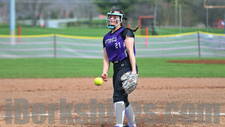iBerkshires.com Columnist SectionSue Bush
More articles from Sue Bush
EMS: Courage And Compassion In ActionBy Shawn Godfrey
12:00AM / Monday, March 26, 2007
 | | Shawn Godfrey is a certified paramedic and the Village Ambulance Service operations manager. |
The Pen Is Mightier Than The Needle
Welcome to "EMS:Courage and Compassion In Action," a weekly column written by Village Ambulance Services Operations Manager and paramedic Shawn Godfrey. Godfrey's columns will appear on Monday and will focus on the reality of the emergency services medical profession.
Paramedics will often use medical information provided at the scene to help determine the patient’s acute illness and overall pre-hospital treatment plan. But what if the patient is unconscious or simply unable to convey this vital information?
Furthermore, if a specific condition is determined, the paramedics are faced with not knowing the safest or, in some cases, most ethical treatment regimen to follow, such what the patient’s wishes are regarding medical care when they die. There may be unknown medication allergies.
In brief, we often use information to talk for our patients when they are unable to talk for themselves.
Here is a scenario to help further delineate this point:
Emergency Care Without Delay
The ambulance is dispatched for a “woman fallen; no further information obtained.â€
After arriving at the scene, the paramedics find the victim laying facedown on the sidewalk, unconscious but alive, with only a small laceration discovered on her forehead. Her skin is pallor and profusely sweating, and a rapid twitch is noted to her left eyelid. There are no friends or family at the scene to provide the patient’s medical information, and the only piece of data collected is from a passerby who states he merely saw the woman fall.
After gently repositioning the woman on her back, opening her airway, and confirming an adequate breathing and pulse rate, the paramedics provide supplemental oxygen and begin searching for signs and symptoms that could explain the reason for the fall and subsequent unconsciousness.
While conducting the physical assessment component of the woman, the paramedics discover a medical alert bracelet with Insulin Dependant Diabetic engraved on its underside. In her handbag, they also find a detailed list of prescribed medications, including the doses, compliance schedules, and refill dates.
After establishing intravenous access and moving her to a long backboard for precautionary spinal immobilization, the patient is transferred into the back of the ambulance.
En route to the emergency department, the woman is given the standard treatment for unresponsiveness. The paramedics immediately test the woman’s blood glucose level (BGL) by injecting a small droplet of her blood into a hand-held electronic meter, known as a glucometer. After sixty-seconds, the BGL level reveals: 20 (a blood sugar of 60 in a non-fasting state is low for many people) which, if left untreated, can lead to permanent brain injury.
The paramedics immediately administer an intravenous form of sugar (treatment for low blood glucose level requires a fast acting sugar given by mouth, or for severe reactions, like this one, it is given in an intravenous form) and closely monitor the patient for positive changes.
During transport, the patient’s condition begins to improve, and by the time the ambulance arrives at the emergency department, the patient’s BGL is 118 (a blood sugar between 80 and 120 in a fasting state is considered normal), her vital signs are stable, and she fully regains consciousness, answering questions appropriately with no cerebral deficiencies evident.
Because vital patient information, like the medical alert bracelet, implied a history of diabetes, the paramedics were immediately prompted to test the woman’s blood glucose level (BGL) and treat the condition without delay.
Helping EMTs Help You
Although the extent of medical information may vary from person to person, everyone should carry a few basic items of information. Although it may not seem significant, medical information of even the smallest detail can prove life saving.
Here are a few ideas you and your family may find useful:
Medical/Surgical History: A single sheet of paper listing your current and past medical/surgical conditions. This can easily be carried in a purse or wallet and should be kept with you at all times. Keep it brief, but concise.
Prescribed Medications: Carry a comprehensive list of your prescribed medications. Be sure to include how often you take the medication and the dosage. Many medications, like blood thinners, blood pressure pills, diuretics, and antiepileptic medicines can determine how you are cared for during an emergency.
Medication Allergies: Like prescribed medications, a detailed list of all medication allergies is equally important. Some people experience life-threatening allergies to commonly used medications, so it is crucial for health care providers to know this information before treating you. Be sure the list specifically distinguishes between medications taken and medication allergies. For example, delineate the allergy list using a different colored pen or font.
Telephone Numbers: It is important to list not only family members in case of emergencies, but also any other health care providers you consult with. These contacts may provide valuable and helpful information during an emergency.
Children’s Information: Parents should carry copies of their children’s medical information; however, if a child is older and is engaged in independent activities, he or she is encouraged to carry their own medical records and contact phone numbers. The list should also include a record of their childhood immunizations, weight and height, and, if applicable, vitamin and mineral use.
Emergency medical treatment often involves difficult and expensive procedures, requiring immediate decision making between the clinicians, family members, and/or guardians. Updating and keeping your own medical information is one of many ways you can actively participate in your care and ensure that you are given efficient, effective, and safe treatment, not only in the emergency setting, but during routine medical visits as well.
|
| Good job! | | from: Jay | on: 03-29 00:00:00-2007 |
|
Shawn-
Thank you for the tips. Being an elderly man and on various medications, I often forget how important it is to have this information available for health care professionals. Could I call my local ambulance squad to obtain forms or already made sheets to put this information on? | | from: Louis (Lou) | on: 03-28 00:00:00-2007 |
|
| This is fantastic, and a perfect example of a great community member. If time permits, you should have community training / awareness on similar topics, especially for people that don't have access to iberkshires. This population may be less informed and require such training. | | from: | on: 03-28 00:00:00-2007 |
|
| Nice job :) | | from: Carrie | on: 03-26 00:00:00-2007 |
|
| Shawn another great article. Knowing what medications the Pt is on helps us as EMS personal with Pt problem at the time when the intervention is needed. Just to have a simple little paper with that info could be the difference between life and death of the that Pt. Keep up the great work and read ya in two weeks. | | from: Chuck | on: 03-26 00:00:00-2007 |
|
| I enjoy this column very much. Keep writing it. | | from: Ahkmed | on: 03-26 00:00:00-2007 |
|
| I started reading your column after I recieved the iberkshires.com newletter and now I am hooked. Every story keeps me waiting for the next!! Keep writing... | | from: Stacy | on: 03-26 00:00:00-2007 |
|
Great article, information is the key!!!
Most of the time you have to investigate and "rule out" all the things that it could be, but having this information on a persons makes the treatment so much fast and increases recovery times.
Also if people have "DNR's" or "Comfort Ones" they need to keep that in a "easy to get to" place.
| | from: Midnight Medicine | on: 03-26 00:00:00-2007 |
|
Shawn,
Your articles are very well written, I enjoy reading them. They are quite popular with a number of people that I work with.
Keep up the good work. | | from: Stan | on: 03-26 00:00:00-2007 |
|
| good article!!!!! keep it up.. | | from: bernie | on: 03-26 00:00:00-2007 |
|
| Im a diabetic and do not wear any form of ID. I often have trouble keeping my blood sugar level so I guess it would help to get one. Thanks!!! | | from: Lee D. | on: 03-26 00:00:00-2007 |
|
| Again nice article Shawn. Please keep up the good work. | | from: George | on: 03-26 00:00:00-2007 |
|
Another great column...informative!
| | from: Stephen | on: 03-26 00:00:00-2007 |
|
| A very helpful article this week, Shawn! It also is helpful as a child of older parents to have that kind of information written down in case my parents can't speak for themselves and we need to have the information in case of an emergency. They take so many medications and I have no idea what they are so the information is helpful. Great job!! ;) | | from: gold deuce girl | on: 03-26 00:00:00-2007 |
|
| Great reminder of the things we could do & info we should keep on us in case of an emergency. | | from: Colleen | on: 03-26 00:00:00-2007 |
|
|
Advertise on
iBerkshires.com
|



















